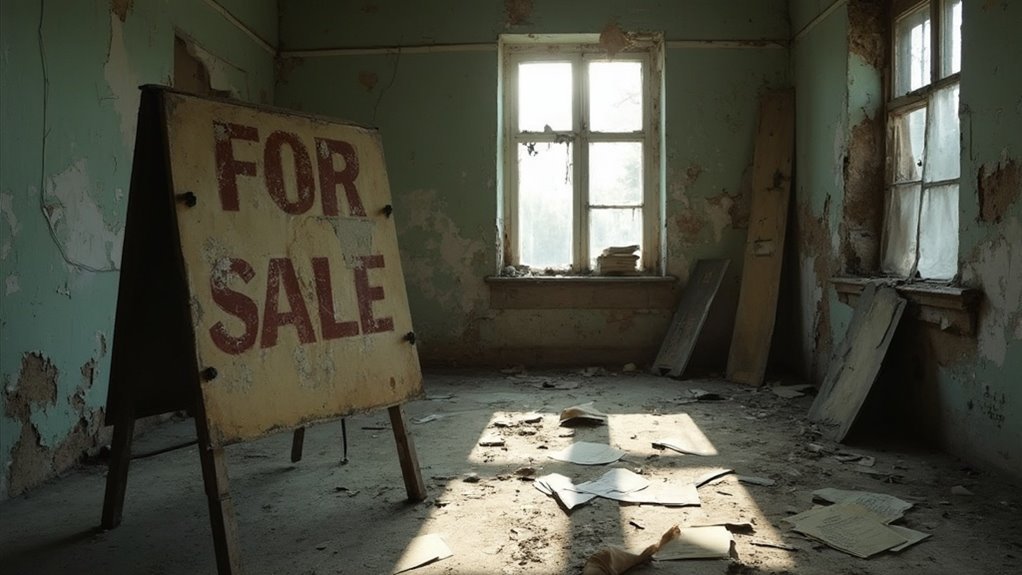Not getting an asbestos inspection before buying or selling a home exposes you to serious health risks, including lung cancer and asbestosis, which may manifest years later. Financially, you could face significant costs for removal, reduced property values, and possible legal liabilities if asbestos is found post-sale. Sellers risk lawsuits for failing to disclose known asbestos, while buyers might encounter prolonged negotiations and market challenges. Moreover, properties with asbestos typically attract lower offers, impacting your profit. Understanding these risks can help you make a well-informed decision about your real estate investment and protect your financial interests.
Health Risks for Buyers

Asbestos exposure frequently poses substantial health risks for buyers, particularly in properties built before 1980. Inhaling asbestos fibers can lead to serious health issues, including various asbestos cancers and respiratory diseases. The most notable risks involve lung cancer and mesothelioma, both directly linked to asbestos exposure. Asbestosis, another severe condition, results in breathing difficulties because of scar-like tissue buildup in the lungs.
Symptoms of asbestos-related diseases often don't appear until 20 to 30 years after initial exposure, making early detection vital. You may additionally experience nonmalignant conditions, such as pleural plaques and pleural thickening, which can further complicate respiratory function. Notably, no safe level of asbestos exposure exists; even minimal inhalation over time can be harmful. Asbestos-containing materials can be found in various locations throughout older homes, increasing the likelihood of exposure during renovations. Moreover, long-term exposure to asbestos fibers can lead to impaired lung and heart function, increasing the risk of severe health complications.
For buyers, understanding these health risks highlights the necessity of asbestos inspections prior to purchase. If asbestos-containing materials are present and disturbed during renovations, airborne fibers can markedly increase your risk of developing severe health conditions. Consequently, by recognizing the dangers associated with asbestos exposure, you can make an informed decision about property investments and prioritize your long-term health and safety.
Financial Consequences for Buyers
Understanding the potential health risks associated with asbestos exposure is just one aspect of the broader implications for buyers. The financial consequences can be significant and far-reaching, affecting your budget and investment.
- Increased insurance premiums because of asbestos presence.
- Legal repercussions from undisclosed asbestos, including potential lawsuits.
- Decreased property value impacting resale potential.
- Costly remediation or removal expenses that can run into thousands.
- Difficulty obtaining asbestos financing or buyer credits.
When you consider purchasing a home with asbestos, you must account for these potential costs. Insurance companies might charge higher premiums, as they view asbestos as a risk factor. Additionally, failing to disclose asbestos can lead to legal action, resulting in financial penalties. The presence of asbestos typically reduces property value, making it harder to sell later.
Investing in proactive asbestos inspections and remediation can mitigate these financial risks. While asbestos testing may cost between $550 and $1,900, addressing the issue early can save you from more significant expenses and complications down the line. Ultimately, understanding these financial implications is essential for making an informed decision in your real estate transactions.
Regulatory Challenges for Buyers

Traversing the regulatory environment surrounding asbestos can be challenging for buyers, especially when it comes to compliance with disclosure laws. Sellers are legally obligated to disclose any known asbestos presence, and failing to do so can lead to legal repercussions. As a buyer, it's vital to insist on professional asbestos testing to verify accurate disclosure, as state regulations and local mandates may impose additional requirements.
| Compliance Aspect | State Regulations | Local Mandates |
|---|---|---|
| Disclosure Requirements | Varies by state; some require immediate disclosure | Local laws may have stricter deadlines |
| Testing Standards | Must meet EPA guidelines; certified inspectors recommended | Additional local certifications may be required |
| Remediation Protocols | State guidelines dictate remediation methods | Local authorities may enforce specific procedures |
To safeguard against hidden risks, you should always request and review asbestos testing reports from sellers. Remember that standard home inspections usually don't include asbestos testing, and professional assessments are critical for identifying potential hazards. By understanding these regulatory challenges, you'll be better equipped to navigate the buying process.
Legal Liability for Sellers
Managing the complexities of asbestos regulations isn't just the buyer's responsibility; sellers also face significant legal liabilities. You must understand your disclosure obligations to avoid severe consequences. Failing to disclose known asbestos presence can lead to legal action, including lawsuits for misrepresentation or breach of contract. Here are some critical aspects to consider:
- Mandatory disclosure: You must inform potential buyers of any known asbestos.
- Inspection reports: Share results of any asbestos inspections conducted.
- Financial penalties: Non-compliance with asbestos regulations can lead to fines.
- Legal disputes: Buyers discovering undisclosed asbestos post-sale can sue for damages.
- Remediation costs: You may be responsible for asbestos removal if not disclosed.
The risks of legal penalties are substantial. Buyers expect transparency, and your failure to comply can stall the sales process, reduce buyer trust, and lead to costly legal disputes. Proactively conducting inspections and ensuring proper disclosures not only protect you legally but also demonstrate ethical responsibility. By taking these steps, you safeguard your interests and improve your property's marketability.
Market Impact for Sellers

As a seller, the presence of asbestos in your property can substantially deter potential buyers, impacting both interest and perceived value. You might face challenges in price negotiations, as buyers often leverage asbestos concerns to request reductions or concessions. Addressing these issues upfront can help maintain buyer confidence and streamline the sales process.
Buyer Determent Factors
The presence of asbestos in a property can substantially deter potential buyers, creating a challenging environment for sellers. This asbestos stigma affects buyer psychology, often leading to significant market impacts. Here are some critical factors that contribute to buyer hesitance:
- Heightened Safety Concerns: Buyers worry about inhaling harmful asbestos fibers, increasing anxiety around health risks.
- Reduced Market Value: Properties with asbestos can see a 5-20% decrease in value compared to asbestos-free homes.
- Withdrawal from Negotiations: Identified asbestos can prompt buyers to withdraw offers, viewing the home as a high-risk investment.
- Legal Risks: Sellers must disclose asbestos presence, with non-compliance potentially leading to fines or lawsuits.
- Inspection Requirements: Homes built before 1980 often require professional asbestos testing, adding complexity to the sale process.
Given these factors, buyers may perceive homes with asbestos as liabilities rather than assets. As a result, sellers must navigate this complex terrain carefully, ensuring compliance while addressing buyer concerns to ease smoother transactions. Understanding these buyer determent factors can empower sellers to make well-informed decisions regarding their properties.
Price Negotiation Challenges
Managing price negotiations in the presence of asbestos can be a formidable challenge for sellers. If you haven't disclosed known asbestos issues, buyers may demand significant price reductions or repairs. To avoid these demands, consider employing effective disclosure tactics by proactively sharing inspection results. Transparency in asbestos testing not only builds trust with prospective buyers but furthermore strengthens your negotiation power.
The costs associated with asbestos remediation can be substantial, often impacting your sale price if left unaddressed. By obtaining estimates for containment or removal and including them in your listing, you can prevent buyers from requesting further discounts. A clear asbestos test report can reassure buyers, reducing the likelihood of price concessions.
When formulating negotiation strategies, weigh the costs of repairs against potential losses in sale price. Offering an allowance for repairs can streamline smoother transactions, allowing buyers to manage issues post-closing. Moreover, utilizing asbestos test reports during negotiations can help prevent last-minute surprises. By adopting proactive asbestos management, you reduce uncertainty and improve your property's marketability, ultimately leading to more favorable negotiation outcomes.
Trust and Reputation Issues
Managing trust and reputation issues in the domain of asbestos inspection requires a keen awareness of the potential ramifications of both disclosure and negligence. When sellers fail to disclose the presence of asbestos, they risk significant reputation damage and trust erosion among potential buyers. Even if sellers are unaware of asbestos in their homes, the lack of transparency can lead to legal repercussions, further tarnishing their credibility.
Consider the following potential consequences:
- Legal actions stemming from undisclosed asbestos can create financial strain.
- Public knowledge of negligence can lead to negative media coverage.
- Word of mouth about asbestos mishandling can spread quickly, damaging future sales.
- Long-term health issues associated with asbestos exposure may lead to ongoing lawsuits.
- A history of asbestos negligence can deter potential clients and partners.
In this sensitive arena, the implications of negligence extend beyond immediate financial consequences. They can create lasting barriers to trust and undermine future business relationships. For sellers and contractors alike, ensuring proper asbestos testing is not just a legal obligation; it's crucial for maintaining a positive reputation in the real estate market.
Importance of Asbestos Testing

Understanding the importance of asbestos testing is vital for safeguarding your health and finances. Exposure to asbestos fibers can lead to severe health conditions, which makes identifying their presence in your home a priority. Moreover, failing to address asbestos issues can result in significant financial repercussions, particularly during property transactions.
Health Hazard Awareness
Asbestos testing is essential since the health risks associated with exposure to asbestos are severe and often life-threatening. Failing to conduct proper testing can expose you and your family to harmful fibers that cause serious diseases. Understanding these risks is critical for effective asbestos prevention and health surveillance.
Consider the following health hazards linked to asbestos exposure:
- Asbestosis, leading to lung tissue scarring
- Mesothelioma, a rare and aggressive cancer
- Lung cancer, a common result of prolonged exposure
- Digestive system cancers, including colon cancer
- Respiratory diseases that can impair daily life
Homes built before the 1980s are particularly at risk, as asbestos was commonly used in construction materials. Testing identifies potential asbestos-containing materials, ensuring safety for homebuyers. It involves careful sampling and laboratory analysis, providing important information for making well-informed decisions about property purchases. Ignoring the need for asbestos inspections can lead to long-term health consequences that are irreversible. Prioritize asbestos testing to safeguard your health and that of your loved ones. By being proactive, you engage in effective asbestos prevention and health surveillance, ultimately protecting your future and well-being.
Financial Implications Consideration
Often overlooked, the financial implications of asbestos testing can substantially impact homeowners and property investors. Increased insurance premiums are likely because of the health risks associated with asbestos, coupled with the high costs of removal. If you fail to disclose asbestos during a sale, you could face severe legal repercussions, resulting in significant financial liabilities.
The presence of asbestos can lead to property devaluation, as potential buyers may shy away because of concerns over health risks and the costs involved in removal. While an initial inspection may range from $200 to $800, the removal costs can escalate into the thousands, especially with widespread contamination. In addition, if asbestos is found after renovations begin, delays can incur additional costs, further straining your budget.
Legal obligations come into play as well; landlords must disclose asbestos in rental properties, and non-compliance can lead to fines. Even if your insurance policy covers some asbestos-related damages, legal battles can quickly drain your financial resources. Consequently, investing in a thorough asbestos inspection upfront can save you from unexpected financial burdens down the line.
Long-term Financial Planning
When planning for the long-term financial implications of a renovation project, it's crucial to factor in the potential costs and legal liabilities associated with asbestos. Ignoring asbestos inspections can lead to significant unforeseen expenses that strain your budget and derail timelines.
Consider the following potential impacts:
- Unplanned budget overruns resulting from unexpected asbestos removal costs
- Financial strain from delays in project completion
- Increased liability risks if exposure affects health
- Legal expenses from potential lawsuits or penalties
- Decreased property value from unresolved asbestos issues
Early identification of asbestos allows for proper budgeting and scheduling, ultimately preventing costly disruptions. Remember, failing to test could mean not only higher expenses but also potential legal ramifications. The financial consequences of asbestos oversight can far exceed the initial investment in testing, making it a vital consideration in your long-term financial planning. By proactively managing asbestos risks, you can maintain financial stability and guarantee a smoother renovation process. This foresight not only protects your wallet but also safeguards the value of your property in the future.
Ensuring Compliance and Safety

Neglecting the importance of asbestos inspections can lead not only to financial repercussions but furthermore to significant compliance and safety risks. If you're buying or selling a home, it's crucial to understand that conducting asbestos inspections is a regulatory requirement for buildings suspected to contain asbestos. Failing to comply can result in hefty regulatory penalties, legal actions, and liability for health-related issues.
To comply with local, state, and federal regulations, you must inform prospective buyers and tenants about the presence of asbestos. The inspection process involves a visual assessment, bulk sampling, and laboratory analysis performed by certified professionals. This thorough approach identifies asbestos-containing materials (ACMs) and evaluates their condition and friability.
Moreover, proper containment measures are critical to prevent the release of harmful fibers during renovations or demolitions. You should recognize that non-disclosure of asbestos can lead to legal disputes and financial losses. Ultimately, adhering to compliance requirements not only safeguards your investment but also protects the health and safety of everyone involved. Prioritizing an asbestos inspection is a critical step in guaranteeing a safe transaction and avoiding potential liabilities.
Frequently Asked Questions
What Are the Signs of Asbestos in a Home?
You can identify asbestos materials by checking for textured coatings, vinyl floor tiles, or dimpling on surfaces. In friable conditions, damaged materials may release harmful fibers, increasing the risk of exposure. Inspect your home carefully.
How Can I Find a Qualified Asbestos Inspector?
To find a qualified asbestos inspector, check for certification requirements under state regulations, ensuring they're licensed by NYSDOL and DEP. Look for inspectors with documented experience and proper training for reliable assessment and compliance.
What Is the Typical Cost of Asbestos Testing?
Asbestos sampling's a financial tightrope; you're typically looking at $1,192 to $3,255, including lab fees. Air testing can cost $200-$800, while material sampling ranges from $250-$750, depending on property size and location.
Can I Sell a Home With Asbestos Without Disclosing It?
You can't sell a home with asbestos without disclosing it. Failing to do so can lead to legal repercussions and violates your ethical obligations to inform buyers about potential hazards, ultimately damaging trust and potential sales.
What Should I Do if Asbestos Is Found During Inspection?
If asbestos is found during inspection, you should prioritize its removal because of health risks. Assess potential legal liabilities and financial impact, including remediation costs, before proceeding with necessary actions to guarantee safety and compliance.
